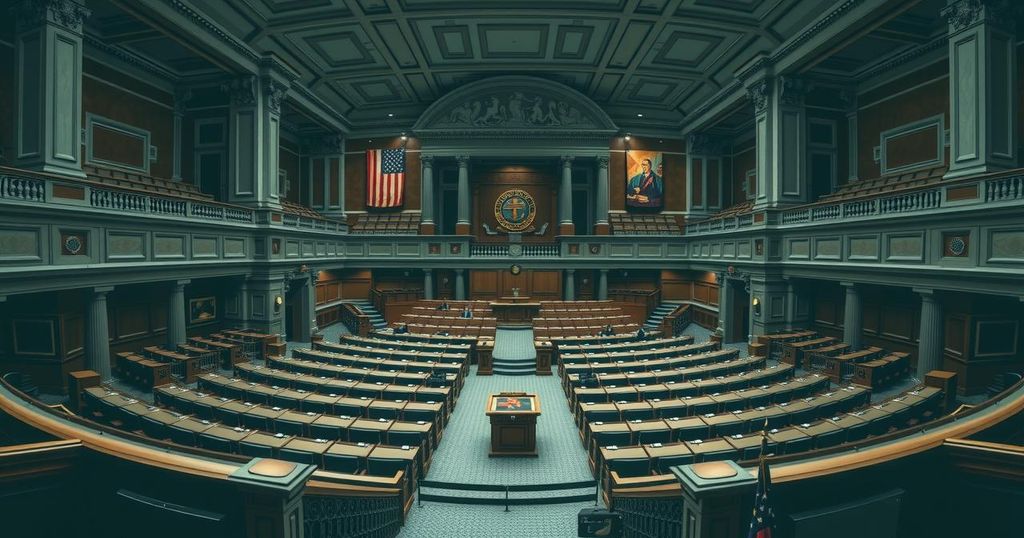The Decline of Opposition: Risks to Democracy in Nigeria’s House of Representatives

The opposition in Nigeria’s House of Representatives is experiencing a concerning decline, characterized by defections and internal conflict, which has weakened its effectiveness against the ruling APC. Initially boasting a majority, the opposition is fading into fragmentation, threatening the democratic landscape. Political patronage and lack of unity within opposition parties are critical factors in this shift. Without a strong opposition, democracy faces significant risks, emphasizing the need for renewed focus and purpose to ensure a vibrant political discourse.
The opposition in Nigeria’s House of Representatives, once characterized by vigorous debates and active dissent, is now witnessing a troubling decline. This downward trajectory is attributed to defections, internal conflicts, and political strategy, undermining its ability to effectively challenge the ruling All Progressives Congress (APC). Consequently, the once robust opposition is fading into a fragmented entity, struggling to maintain its influence.
At the beginning of the 10th National Assembly in June 2023, the opposition boasted a slim majority with 182 seats compared to the APC’s 175. The People’s Democratic Party (PDP) had the largest representation with 118 seats, followed by the Labour Party (LP) and the New Nigeria Peoples Party (NNPP). This numerical advantage provided a critical opportunity for the opposition to shape legislation and offer alternative governance perspectives.
However, the opposition has recently seen a significant decline in both membership and influence. Defections have struck the PDP and the LP, with several lawmakers migrating to the APC, leaving the opposition fragmented. Lawmakers are increasingly prioritizing their political survival over collective dissent, opting for silence and alignment with the government rather than challenging its authority.
Analysts attribute this trend to political patronage, where the ruling APC’s control over resources makes defection appealing. Those who remain in the opposition may risk exclusion from key policy discussions and constituency advancements. For example, Hussein Jallo, who switched allegiance from the PDP to the APC, cited inspiration from the ruling party’s leadership as a motivating factor for his decision.
The internal strife within the opposition is intensifying the situation. The PDP grapples with leadership fragmentation and disagreements that undermine its unity, while the LP struggles to establish sustainable organizational structures essential for member engagement. This lack of a unified strategy encourages lawmakers to defect rather than fight for party principles.
The implications of the weakening opposition are considerable for Nigeria’s democracy. Analysts emphasize that without a robust opposition, democratic institutions are compromised; the ruling party could operate without critical examination or debate, eroding the foundation of democratic governance. Innocent Awuzie, a political analyst, has highlighted the risk this poses not only to the National Assembly but also to the broader electoral landscape, as defecting lawmakers take with them crucial support resources, hindering opposition parties in future contests.
To regain its influence, the opposition must focus on internal cohesion, strengthen party frameworks, and articulate a clear governance vision to regain public trust. It is vital for lawmakers to resist the temptation of immediate power and strive to preserve the dynamism of democracy in Nigeria. Without this, the voices of dissent may become entirely silent, rendering the Green Chamber an echo of the ruling party’s will.
The decline of the opposition in Nigeria’s House of Representatives poses significant risks to the nation’s democratic health. As defections from the opposition to the ruling party increase, the capacity of dissenting voices to influence governance diminishes. Political patronage and internal conflicts within opposition parties have further exacerbated this issue, allowing the ruling APC to operate unchecked. For democracy to thrive, it is imperative for opposition lawmakers to unite and redefine their purpose to offer a credible alternative to the ruling party, thereby revitalizing the democratic process.
Original Source: businessday.ng







